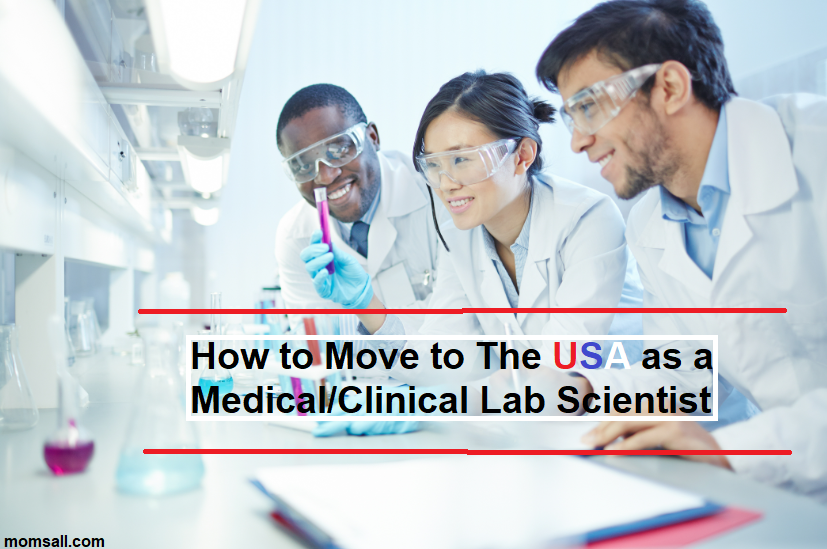The United States of America is a dream destination for many medical laboratory scientists who want to broaden their horizons and explore new opportunities. The US has a well-established healthcare system that provides high-quality services to patients, and it is home to some of the world’s leading medical research centers. As such, it is not surprising that many medical laboratory scientists from around the world aspire to work in the US. However, moving to the US as a medical laboratory scientist can be challenging. We will provide a comprehensive guide on how to move to the USA as a medical/clinical lab scientist.
- How Can Foreign Medical Laboratory Scientists Work in the United States?
- How Can I Work as A Medical Laboratory Scientist In USA?
- How Much Are Medical Laboratory Scientists Paid In USA?
- Hospitals That Sponsor H1b Visa for Medical Technologists In USA
- Comparison Working as a Medical Lab Scientist in the USA vs the UK
- USA vs UK for Med Lab Scientists
- How to Migrate to The USA as a Medical/Clinical Lab Scientist
- What Kind of Visa Do You Need to Work as a Medical/Clinical Lab Scientist in the USA
- How to Get a Medical Laboratory Internship Program in the USA as a Non-American
- Conclusion
How Can Foreign Medical Laboratory Scientists Work in the United States?
Foreign medical laboratory scientists who want to work in the US must meet specific requirements. The first step is to ensure that their educational qualifications are equivalent to those obtained in the US. To verify this, they must get their credentials evaluated by an approved credential evaluation agency.
ALSO READ: Are Nurses From Ghana and Nigeria Still Needed in the UK?
Once their credentials have been evaluated, foreign medical laboratory scientists must pass a certification examination. This exam is offered by the American Society for Clinical Pathology (ASCP). The ASCP offers various certification exams, including;
- The Medical Laboratory Scientist (MLS) exam,
- The Medical Laboratory Technician (MLT) exam,
- The Specialist certification exam.
Passing the appropriate certification exam is essential for foreign medical laboratory scientists who want to work in the US.
How Can I Work as A Medical Laboratory Scientist In USA?
There are several steps involved in working as a medical laboratory scientist in the US. These steps include the following:
- Obtain the necessary educational qualifications: To work as a medical laboratory scientist in the US, you must have a Bachelor’s degree in medical laboratory science or a related field. Some employers may also require a Master’s degree.
- Get certified: As mentioned earlier, passing the appropriate certification exam offered by the ASCP is essential for foreign medical laboratory scientists who want to work in the US.
- Gain work experience: Many employers in the US prefer medical laboratory scientists with work experience. Some employers may require a minimum of 1-2 years of work experience.
- Apply for jobs: Once you have the necessary educational qualifications, certification, and work experience, you can start applying for jobs. You can search for medical laboratory scientist job openings on various job websites, such as Indeed, Glassdoor, and LinkedIn. You can also directly contact healthcare organizations and hospitals.
ALSO READ: Apps that Help You Pass Your Life in the UK Test – Life in the UK Test App
How Much Are Medical Laboratory Scientists Paid In USA?
The salary of medical laboratory scientists in the US varies depending on several factors, including their level of experience, location, and employer. According to the Bureau of Labor Statistics (BLS), the median annual wage for medical laboratory scientists in the US was $53,120 as of May 2020. The lowest 10 percent earned less than $31,320, and the highest 10 percent earned more than $84,120. The BLS also reports that medical laboratory scientists working in general medical and surgical hospitals earned a median annual wage of $57,190 as of May 2020.
Hospitals That Sponsor H1b Visa for Medical Technologists In USA
The H1B visa is a non-immigrant visa that allows US employers to temporarily employ foreign workers in specialty occupations. Some hospitals in the US sponsor H1B visas for medical technologists or medical laboratory scientists. However, the availability of H1B visas is subject to annual caps and specific requirements.
To find hospitals that sponsor H1B visas for medical technologists, you can search for job openings. This is done on various job websites such as H1Bjobs.com, Glassdoor, and LinkedIn. You can also directly contact the hospitals.
ALSO READ: Why UK Nurses are Leaving to Australia – Can a UK Nurse Move to Australia?
Comparison Working as a Medical Lab Scientist in the USA vs the UK
If you’re considering working as a medical laboratory scientist, you may also be weighing the pros and cons of working in the USA versus the UK. While both countries have robust healthcare systems, there are some key differences to consider.
One major difference is the salary. According to Payscale, the average salary for a medical laboratory scientist in the USA is around $62,000 per year. In the United Kingdom, the average salary is around £29,000 (equivalent to around $40,000 USD). The cost of living in the USA is generally higher than in the UK. This will affect your decision-making.
Another difference to consider is the education and training required. In the United States, medical laboratory scientists typically need a bachelor’s degree in medical laboratory science or a related field, as well as certification from a recognized organization such as the American Society for Clinical Pathology (ASCP). In the United Kingdom, medical laboratory scientists typically need a degree in biomedical science or a related field, as well as registration with the Health and Care Professions Council (HCPC).
USA vs UK for Med Lab Scientists
When it comes to visas and immigration, the United States generally has more strict requirements than the United Kingdom. As mentioned earlier, to work as a medical laboratory scientist in the United States, you’ll typically need an H1B visa which can be difficult to obtain. In the United Kingdom, EU citizens have historically had the right to work without a visa, but this may change now that the UK has left the European Union.
The decision to work as a medical laboratory scientist in the USA or the UK depends on your personal preferences and priorities. It’s important to do your research and carefully consider all factors before making a decision.
ALSO READ: Canada Work Visa Self Assessment Tests 2023 – Procedure
How to Migrate to The USA as a Medical/Clinical Lab Scientist
Are you a medical or clinical lab scientist looking to work in the United States? There are several steps you need to take to make that happen. Here are some of the things you’ll need to do:
- Determine your eligibility: Before you begin the process of immigrating to the United States, you need to make sure you meet the eligibility requirements. Generally, you’ll need to have a degree in medical or clinical laboratory science, as well as relevant work experience. You may also need to take certain exams or obtain specific certifications depending on the state you plan to work in.
- Find a job: In order to immigrate to the United States as a medical or clinical lab scientist, you’ll need to have a job offer from a U.S. employer. There are several ways to find job openings, including online job boards, industry publications, and networking with other professionals in the field.
- Obtain a work visa: Once you have a job offer, you’ll need to obtain a work visa. The most common type of visa for medical or clinical lab scientists is the H-1B visa, which is available to individuals with specialized knowledge or skills. Your employer will need to sponsor your visa application, which requires them to file a petition with U.S. Citizenship and Immigration Services (USCIS).
- Attend a visa interview: If your visa application is approved, you’ll need to attend a visa interview at a U.S. embassy or consulate in your home country. During the interview, you’ll be asked about your background, qualifications, and reasons for wanting to work in the United States.
- Obtain a green card: While the H-1B visa allows you to work in the United States temporarily if you want to stay in the country long-term, you’ll need to obtain a green card. This process can be complex and time-consuming, but there are several options available to medical and clinical lab scientists, including employer sponsorship and family sponsorship.
- Meet state licensing requirements: Once you’ve obtained a work visa or green card, you’ll need to meet the licensing requirements for the state in which you plan to work. These requirements vary by state but generally involve passing a licensing exam and demonstrating that you meet certain education and experience requirements.
- Maintain your status: Finally, it’s important to make sure you maintain your legal status while working in the United States. This means keeping your visa or green card up to date, complying with all U.S. laws and regulations, and reporting any changes in your employment or personal circumstances to the appropriate authorities.
ALSO READ: Coca Cola Careers 2023 – Apply Online
Overall, immigrating to the United States as a medical or clinical lab scientist can be a complex process. With the right preparation and support, it’s definitely possible.
What Kind of Visa Do You Need to Work as a Medical/Clinical Lab Scientist in the USA
Working as a medical/clinical lab scientist in the USA, you will need a visa that permits you to work legally. The type of visa you need will depend on several factors. These factors include; your qualifications, experience, and the specific job you are applying for. Below are some of the most common visa options for medical/clinical lab scientists:
- H-1B visa: This is the most common type of work visa for professionals in the USA. It is intended for individuals with a bachelor’s degree or higher in a specialized field, including medical/clinical laboratory science. To qualify, you must have a job offer from a US employer and meet other eligibility requirements. The H-1B visa is valid for up to three years, with the possibility of an extension for an additional three years.
- TN visa: The TN visa is available to citizens of Canada and Mexico who work in certain professional occupations, including medical/clinical laboratory science. To qualify, you must have a job offer from a US employer, and your job must be on the list of approved professions. The TN visa is valid for up to three years, with the possibility of an extension.
- O-1 visa: The O-1 visa is intended for individuals with extraordinary ability in their field, including medical/clinical laboratory science. To qualify, you must have a high level of achievement and recognition in your profession. You will need to provide evidence of your accomplishments, such as awards, publications, and patents. The O-1 visa is valid for up to three years, with the possibility of an extension.
- J-1 visa: The J-1 visa is intended for individuals participating in work-and-study-based exchange programs, including medical/clinical laboratory science. To qualify, you must have a job offer from a US employer that is part of an approved exchange program. The J-1 visa is valid for the duration of your program, which can range from a few months to several years.
How to Get a Medical Laboratory Internship Program in the USA as a Non-American
Are you a non-American looking to gain experience in the medical laboratory field in the United States? One option to consider is a medical laboratory internship program. These programs are typically designed for students or recent graduates and provide hands-on training in a real-world laboratory setting.
To apply for a medical laboratory internship program in the United States, you’ll typically need to meet certain requirements. This includes having a degree in a relevant field or being enrolled in a relevant program at a university. You’ll also need to research and identify potential programs that align with your interests and goals.
Some potential medical laboratory internship programs to consider include:
- The Mayo Clinic Medical Laboratory Science Program
- The Cleveland Clinic Medical Laboratory Science Program
- The Johns Hopkins Medical Laboratory Science Program
To apply for these programs, you’ll typically need to submit an application, transcripts, letters of recommendation, and other supporting materials. Some programs may also require an interview or entrance exam.
It’s important to note that as a non-American, you’ll also need to obtain the appropriate visa. This will help you to participate in a medical laboratory internship program in the United States. This may require working with an immigration attorney or other legal professional to navigate the process.
ALSO READ: Germany Work Visa Process 2023 – How to Apply
Conclusion
Working as a medical laboratory scientist in the United States can be a rewarding and lucrative career path. But it also requires dedication, education, and often, significant immigration hurdles. By following the steps outlined in this article, you can increase your chances of successfully navigating the process. This will land your dream job in the field.





